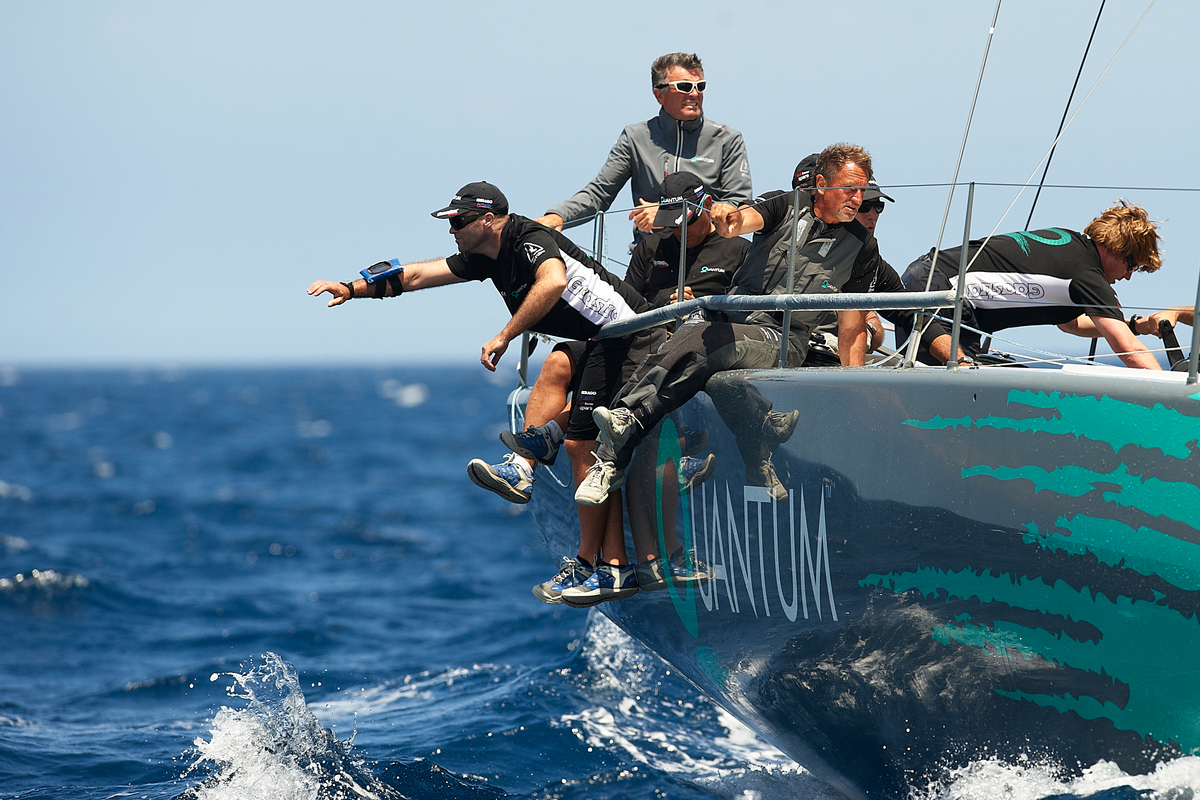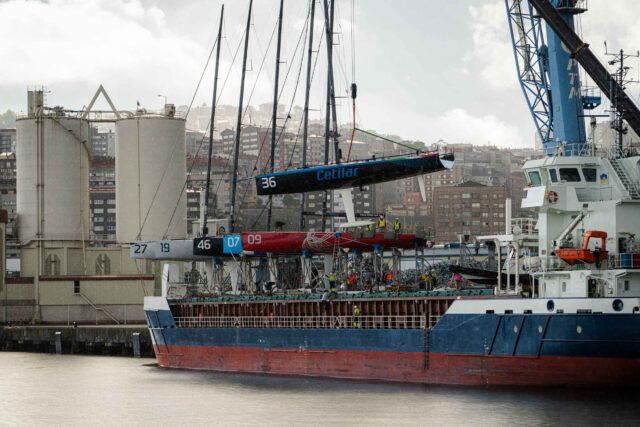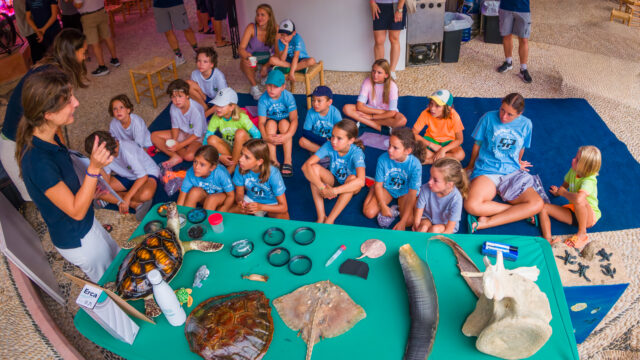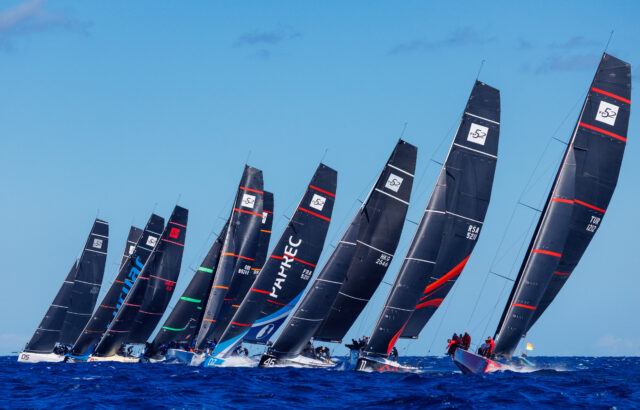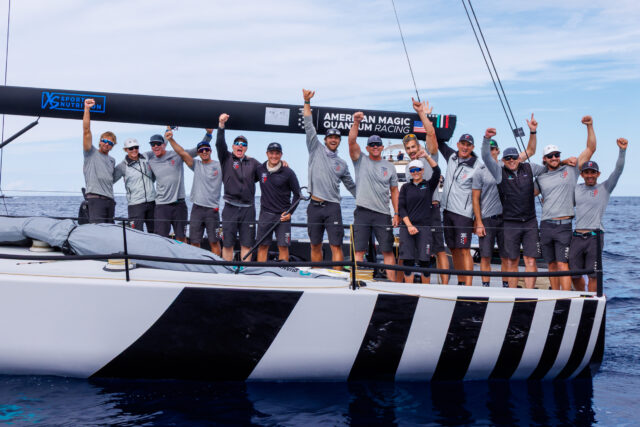That he has won world match racing titles with skipper Ed Baird and Tom Burnham ensures that the communication patterns at the back of the boat have been, by all accounts, smooth. And the results speak for themselves. Two from two, wins in Barcelona and Porto Cervo, confirm that the ‘green’ team’s afterguard is functioning well.
Horton is happy. At the back of his mind it maybe niggles that he won’t be the US Sailing Team’s Star helm taking on the world at the Olympic Regatta next month in England, but he is racing with the top professional grand prix monohull racing team in the world at the moment, still learning. And instead of the Olympics he will be home for the birth of his first baby, a daughter, in August. Life is sweet:
How did you come to join the Quantum Racing Team?
I did some match racing with Ed (Baird) a few years ago and with Tommy Burnham and we did the Circuit in 2003-4-5 and we won a couple of world championships and won a few regattas and we had a good time sailing together and then I got a job with Luna Rossa for the 2007 America’s Cup, up the mast, doing strategy and traveller at different events, in the afterguard basically. And then I got a job at Alinghi where Tommy Burnham was. And I think we all enjoy sailing together and see things the same way.
So this year when they were looking for somebody they asked if I would come and join them. For me it was a no-brainer. We have done a lot sailing together and – as I said – we see things the same way. That is a lot about the way we communicate, our styles I would say. I am not a dictator, some tacticians are 100% dictator. But I am not 100% democrat either. I am in between. I am the same as Ed, quite laid back, but we expect somewhere the same high level from everybody. I use him a lot for what is going on with the boat, with how it feels.
So just pinpoint what that style and way of operating is? It is no secret that Quantum Racing had their rocky moments last year. The cultural foundations are very much American.
The style is very much cultural and a lot of what I do is down to the helm, and with Tommy helping with strategy and with Juan, you have to understand culturally the weighting of what they are saying, if that make sense. For instance if someone says this will never happen, in English as in American, it is never going to happen.But to other people that might mean something different. So we do try to quantify things, in percentages maybe, things we are talking about. So for starting and we want to win the pin we would not say we want the left here, we would say the weighting is 90:10, which is a must have win the pin, 10% it might not work. If it’s 50:50, 60:40 we give it the weighting ahead of time just to keep the clean line of communication.
We try to do that as much ahead of time so that when the moment of decision happens you have already prepared for it, for Ed, for his risk on say on the start line where there is a big battle and there is just a 50:50 chance of winning the battle weighting then he will say, it’s not that important let’s go for a great start somewhere else.
And presumably the expectation of how you thought it would be on the team and on the 52 SuperSeries Circuit is as you thought it would be?
It is pretty similar to what I expected. It is a great team, great sails, great boat, well prepared, do everything the right way. It is very cool, a mini America’s Cup team. It is all of the expectations and it is really nice to work with great people who are into it, who are focused as much as I am interested in getting better, and can do that collectively. This is such a great forum for that. A lot of times if you are sailing in a class where there are restrictions on pro limits, then your job is making other people better, and of course you are always trying to make yourself better, but you don’t always have other people pushing you. I love it here, because it allows me to focus on my job, pure and simple as a tactician. If you sail RC44 or Melges 32, then it is different. This is very different. And I am doing both of them. I sail with Ironbound and in the 32’s with a team called Bronco. It is different, I do everything with that programme, put the team together, run it, you have the hat of a coach, sometimes an organiser and a tactician around everything else, but I do enjoy that as well, it is nice to work with different people.
You raced on the MedCup Circuit before, didn’t you? And what is your input into making the boat go fast, if anything?
I sailed with Caixa Galicia in 2008, that was the year that CAM sunk, when Quantum won. The Russians took us out in Marseille if you remember. We chartered Artemis (which is now Paprec Recyclage) and so it was nice to have a good boat. That boat was better than the boat we were sailing. It is a balance on this boat, I give my underlying feeling… if the boat is too ‘helmy’ or something like that, once a day I might have input like that, but 30% of the time I am talking about the mode we want to sail, looking at other boats and giving information for the speed loop, what we are trying to achieve, to get out of it. We might have a good VMG mode, we might sail a little fast to gain some bearing, we might want some height to peel someone off. That is all down to the speed loop more than anything. 70% of my time is looking around, reading the breeze.
There are all different species of tactician. Some are distinctly seat of the pants, intuitive and others sail their races by numbers, everything is empirical, where do you fit on that scale, and what do you think you are best at?
I enjoy reading the breeze. I think that I probably like reading the pressure on the course and do a good job at that. I think so. I like the match racing side of the sport, I am pretty comfortable with positioning the boat and all that, and with this group we have done a fair bit of that with this group. Patterns, looking for, reading and finding patterns….though is saying that I am reading an interesting book which would say that all that we see in patterns in a day is BS, the book is Thinking Fast and Slow. I read that kind of stuff it intrigues me. It says that we generally jump to conclusions, that we see things happen one time and believe it will always happen.
And are you missing the Olympic racing, regretting not going to the Games?
A little bit. We took a stab for this quad, but we did not really get the equipment right and did not sail enough. I feel like with the Olympics now there are very, very few sailors who can be at the top level in Olympic sailing and at the top level in other sailing. How many can you name who can go sail something like this or America’s Cup. At the 2007 Cup there might have been two or three athletes who did the Olympics and the America’s Cup and that was five years ago. We will still see that same number at these Games and I am thinking. They will be further apart given that it’s catamarans. There used to be that path, but now there is only Ben Ainslie and Iain Percy and perhaps Rafa. (Rafa Trujillo)
I take it that money was part of the equation when you decided to pursue other sailing?
It was self funded and it was hard. But that is always one of the issues we have in the US. There is a little bit of help but that does not even touch 20% of the budget. So you work doing this kind of sailing to make the money to go pay for your Olympic sailing. Would I do it again? I think so. I would love to. The frustrating thing is the funding part of it, there is not enough time to work to fund it, and to do the programme. This last time I had an owner who was very helpful, but then the three regattas he asked me to come and sail with him, all were direct overlaps with Olympic trials or super important events.
So what does it take financially?
At a sensible level, don’t show up unless you can spend $100,000 a year, to be competitive and comfortable you would need to be double that, per year. And that is not probably capital expenses of new boats and so on. I have a couple of boats if anyone wants them.
So you’ll be home when the Games are on?
I am having a baby, August 26th, I think she will be early. I am just hoping the timing will be that way because if it is it is an amazing year with the Olympic and the space around them and that happening at the same time. It is someone telling me something! We have seven weeks and that happens right in the middle of that.
Tell us about your home life, growing up, and your sailing?
Burlington VT, it is a nice place, where I grew up. I went to away to do a lot sailing and university. I went to a place called Hobart and William Smith colleges. It was a cool place, not a big Varsity team, just a little place with a coach who was hired a year before I got there, Scott Ikle, who was a former pro sailor who used to sail on Infinity with John Thomson, sailed 505’s. He settled down there and recruited a few of us, and before I finished we had won four All Americans and were ranked number one in the country and were a Varsity team, fully funded. So we went from a little team where we would drive ourselves, could not even pay to go to events, to now having boat houses and have won a few national championships. Trevor Moore, who sailed 49ers for the US went there. I did all that and then the America’s Cup in 2007 in Valencia.
I met my wife in 2007, she went to college at my home town and got a job at a high end food magazine, called ‘Eating Well‘, which happens to be in my home town. Her degree is in nutritional communication, she would work in a lot of public policy units or, say in Kraft, where she could tell them what they can and can’t say.
So that is something you are passionate about:
It is a pretty cool time. They have a pretty cool little company where they practice awesome sustainable food. We do that at home, we have a CSA, Community Shared Agriculture, where we buy a share in a farm essentially, for different seasons. We pay a percentage, so like $650 for a summer share, and so they guarantee us locally sourced organic vegetables every week. And they do trades with local bread makers, cheese makers, wine makers, bread makers, fruit, so we get everything really, all produced within 30 miles of our house. The average usually is something like 1500 miles, but it is something we feel strongly about. It is good for the farmer because they have the money ahead of time, it is good for us, and the food’s awesome.
And what do you have left as ambitions in sailing? And, like many other pro sailors, you’d like to get back into the ‘Cup.
I just want to get better, to improve all the time. Yeah, at some time, no one knows where and when, but at the right time, with the right group in the right place, that was my graduate school.
Do you have time to do anything other than sail in terms of sports?
I have just got into paddleboarding, my wife has just got me one of these, that is my newest thing. But, otherwise it is anything outside, hiking, snowboarding, climbing, anything – it is a very outdoors culture…’crunchy’ as we call it in the States.
How many days do you sail a year?
150 days probably. I try to keep it down, the balance between earning more and having a home life, it is a hard balance and I find that balance around 150 days. Other than during the Cup, at the peak of Star sailing I did 240, but that is too much. I like to be home. As well as seeing my wife, of course, I like to see my dog!


 52 SUPER SERIES – 2026 SEASON
52 SUPER SERIES – 2026 SEASON